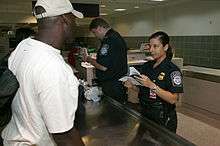Border control


Border controls are measures taken by a country to monitor or regulate its borders. Border controls are put in place to control the movement of people, animals and goods into as well as out of a country. Specialized government agencies are usually created to perform border controls. Such agencies may perform various functions such as customs, immigration, security, quarantine, beside other functions. Official designations, jurisdictions and command structures of these agencies vary considerably.
.jpg)
History
Border controls were only sporadically implemented until World War I.[1]
Functions
Border controls exist to:
- regulate immigration (both legal and illegal)
- control the movement of citizens
- execute the customs functions as to
- collect excise tax
- prevent smuggling of drugs, weapons, endangered species, humans and other illegal or hazardous material, or prevent wanted criminals from international travel.
- control the spread of human or animal diseases (see also quarantine)[2]
Specific requirements
The degree of strictness of border controls depends on the country and the border concerned. In some countries, controls may be targeted at the traveler's national origin or other countries that have been visited. Others may need to be certain the traveler has paid the appropriate fees for their visas and has future travel planned out of the country. Yet others may concentrate on the contents of the travelers baggage, and imported goods to ensure nothing is being carried that might bring a biosecurity risk into the country.
Between countries in the Schengen Area, internal border control is often virtually unnoticeable, and often only performed by means of random car or train searches in the hinterland, while controls at borders with non-member states may be rather strict.
Sometimes border controls exist on internal borders within a sovereign state. For example, in the People's Republic of China, there are border controls at the borders among the mainland and the special administrative regions of Hong Kong and Macau. All persons need to present their passports or other types of travel documents to cross the border. For example, Hong Kong Permanent Identity Card and Home Return Permit are required for Hong Kong Permanent Residents who are Chinese citizens to cross the border. Another example is the Malaysian states of Sabah and Sarawak, each having separate border controls from the rest of Malaysia. Also Norway exercise passport check when travelling between mainland Norway and the archipelago of Svalbard which is non-Schengen area.
Informal border controls
In some cases countries can introduce controls that functions as border controls but aren't border controls legally and don't need to be performed by government agencies. Normally they are performed and organised by private companies, based on a law that they have to check that passengers don't travel into a specific country if they aren't allowed to. Such controls can take effect in one country based on the law of another country. Even if they aren't border controls they function as such. The most prominent example is airlines which check passports and visa before passengers are allowed to board the aircraft. Also for some passenger boats such check are performed before boarding.
See also
References
- ↑ Keynes, John Maynard (1920). "II Europe Before the War". The Economic Consequences of the Peace. New York: Harcourt Brace.
- ↑ Champion P.D.; Hofstra D.E.; Clayton J.S.(2007) Border control for potential aquatic weeds. Stage 3. Weed risk assessment. Science for Conservation 271. p. 41. Department of Conservation, New Zealand.
Further reading
| Wikimedia Commons has media related to Border control. |
- Susan and aramis "Residues of Border Control", Southern Spaces, 17 April 2011.